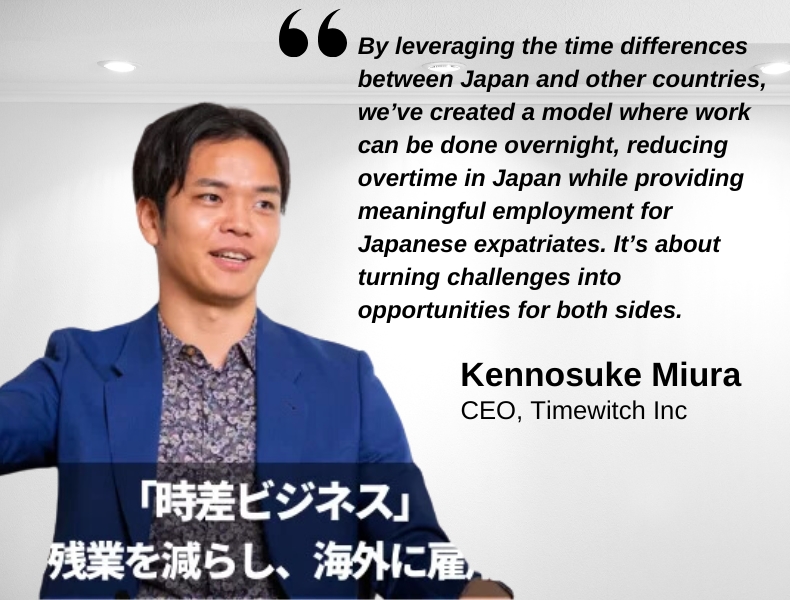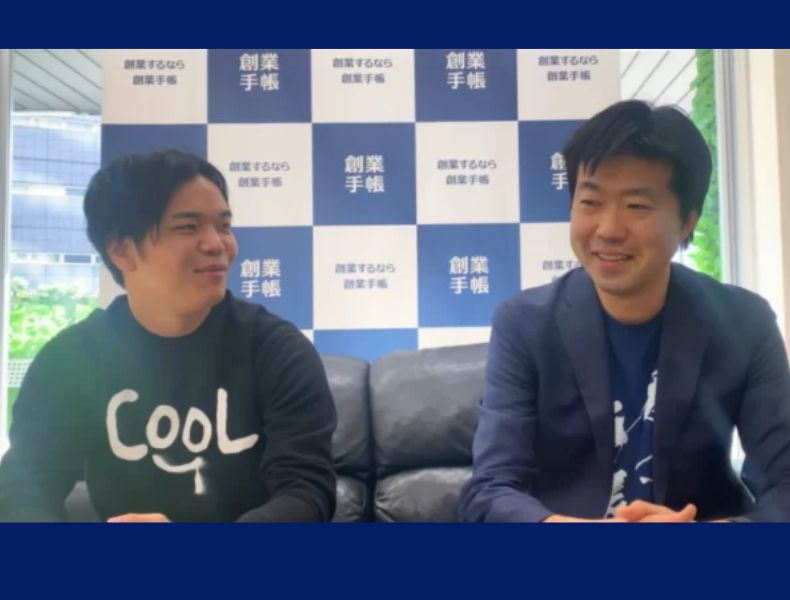Leveraging Time Differences: “Order at Night, Deliver the Next Morning”

By utilizing time differences, Timewitch has successfully realized the concept of “order at night, deliver the next morning.” The long-standing issue of excessive overtime in Japanese companies has prompted work style reforms, including caps on overtime hours. Simultaneously, countries with high unemployment rates face unique challenges, particularly for Japanese expatriates struggling to find meaningful employment abroad.
Even for those fortunate enough to secure work overseas, many Japanese expatriates are unable to find opportunities that align with their skills and experience. Recognizing this gap, Timewitch, led by CEO Kennsuke Miura, has turned the challenge into an opportunity by reducing overtime in Japanese companies while creating jobs for Japanese nationals living overseas.
In this interview, Kosei Okubo, CEO of Sogyotecho, speaks with Miura about his journey to establish Timewitch, the inspiration behind the time-difference business model, and the problems it seeks to address.
[profile_box name=”Kennosuke Miura” title=”CEO, Timewitch Inc” image=”https://foundersguide.com/wp-content/uploads/2025/01/Kennosuke-Miura.jpg”]- Education: Graduated from the Department of Architecture, School of Creative Science and Engineering, Waseda University.
- Career: Worked in marketing at Dentsu, focusing on advertising and web data utilization. Later transitioned to management consulting at Boston Consulting Group (BCG), where he developed business strategies.[/profile_box]
- Career: A former executive at a leading IT venture, Okubo observed common challenges faced by entrepreneurs. This inspired the creation of Sogyotecho, which serves as a guidebook and resource for startups.
- Achievements: Author of the “Startup Handbook,” with over 2.5 million copies sold. Leads a successful entrepreneurship platform with over 1 million monthly visitors, serves as a Cabinet Office committee member, and teaches at universities.[/profile_box]
Highlights from the Interview
Turning a Personal Tragedy into Purpose
Okubo: Could you tell us about the inspiration behind starting Timewitch?
Miura: I followed the traditional Heisei-era career path—entering a top university, joining an advertising agency, and climbing the corporate ladder. However, a turning point came when a colleague tragically died by suicide due to overwork. This event made me rethink my career and consider independence as a viable option.
After four years in advertising, I transitioned to management consulting at BCG. It was a fruitful time where I systematically learned how to think critically and achieve results. These experiences shaped my approach when I eventually started Timewitch, which now employs a team of 13.
From Brazil’s Unemployment Crisis to a Win-Win Solution
Okubo: How did you come up with the idea for Timewitch?
Miura: The idea came during the COVID-19 pandemic. Brazil, which had one of the world’s highest death tolls, also experienced a sharp rise in unemployment, with one in five citizens out of work. I wondered if I could address both Brazil’s employment crisis and Japan’s excessive overtime problem.
By leveraging the time difference between Japan and Brazil, we envisioned a model where Brazilian workers could handle overnight tasks for Japanese companies. This concept allows work assigned at the end of the Japanese workday to be completed by the next morning.
Challenges and Adaptations
Okubo: What challenges did you face when implementing this model?
Miura: Initially, we attempted to work with local Brazilians, but language barriers, punctuality issues, and unfamiliarity with computers made it difficult. We pivoted to hiring Japanese expatriates in Brazil. Surprisingly, there are around 1 million Japanese nationals living abroad, many of whom were displaced from jobs during the pandemic. We built a network to connect these individuals with opportunities to contribute to Japanese businesses.

Building on Global Time-Zone Economics
Okubo: How does Timewitch’s model compare to other time-zone outsourcing systems, like those between the U.S. and India?
Miura: It’s similar, as the economy essentially operates at double the speed. At BCG, we used an international system where teams in India, the U.S., and Spain collaborated in 8-hour shifts. However, Japan lacks the infrastructure and language proficiency to implement such systems widely, making Timewitch’s model a unique solution.
Gratitude from Japanese Expatriates
Okubo: What moments have reaffirmed your decision to start Timewitch?
Miura: During the pandemic, we received heartfelt letters from expatriates thanking us for providing jobs when they had no support systems abroad. Knowing that we’ve created a meaningful impact on their lives is the most rewarding part of this journey.
Reflections and Advice for Entrepreneurs
Okubo: What advice would you give to aspiring entrepreneurs?
Miura: Start by trying various approaches—test at least 100 ideas to find the one that resonates most. It’s important to build a logical presentation of your vision, as this can often drive momentum even for initially unconventional ideas.
Additionally, surround yourself with people more skilled than you. Delegate responsibilities, and your business will naturally grow.
Disclaimer: This article is an English translation of the original content published on the website sogyotecho.jp, which is the parent company of the Founders Guide website. The translation aims to provide information to English-speaking readers while maintaining the essence of the original article. Please note that any discrepancies or inaccuracies in the translation are unintentional. For the most accurate and up-to-date information, kindly refer to the original article in Japanese on sogyotecho.jp